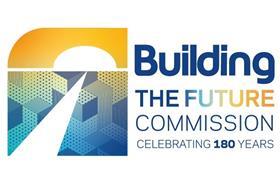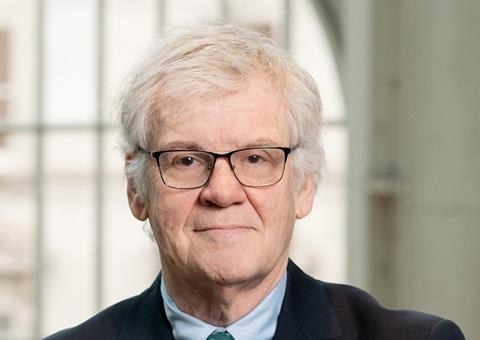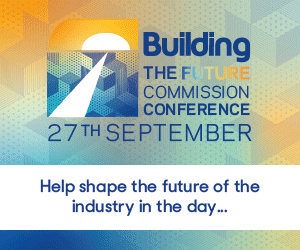In the second part of our interview, veteran industry heavyweight Paul Morrell describes his time in Whitehall and considers whether we need a similar role again.


>> To read part one of the interview click here
The ║├╔½Ž╚╔·TV the Future Commission, ║├╔½Ž╚╔·TVŌĆÖs ambitious 12-month project to improve the built environment, has already thrown up quite a few ideas and solutions to boost the industry. One of the most eye-catching came in a debate in April among our panel of high-profile commissioners.
Several members of the panel talked passionately about the possibility of introducing an appointment at government level to advise on construction issues.
Paul Morrell, an industry veteran who spent nearly four decades at Davis Langdon, and has recently written a report for the government on construction products testing, can provide a unique take on this. He was one of only two people to hold the cross-departmental role of chief construction adviser to the government from 2009 to 2012 (for an extra point, the other was Peter Hansford, president of the Institution of Civil Engineers).

So in our quest for solutions, would a return of this role help boost the industry?
I ask Morrell (pictured), in our chat via Teams, whether having a ŌĆ£voice of constructionŌĆØ back in the corridors of power would be a good idea, based on his experience.
ŌĆ£That wasnŌĆÖt how I saw the job,ŌĆØ Morrell interjects. ŌĆ£I was always very clear that the minute I became a lobbyist, the value of the job was finished. Most propositions made to government are lobbying and ministers are completely immune to it.ŌĆØ
One of the most depressing aspects of the job, he says, was seeing how many people used a moment with a minister to pursue a narrow interest. ŌĆ£Your conversation should be, ŌĆśI could provide a better service to citizens, minister, if you could do this. Something for something. As opposed to, ŌĆścould you make seatbelts compulsory because I manufacture seatbeltsŌĆØ.
Government must be a better client, how many times would I say to ministers, if you want a better answer youŌĆÖve got to start by asking a more intelligent question than how much does it cost?ŌĆØ
This distinction between lobbyists and those on the inside was made recently by Mark Wild, chief executive of SGN, at a ║├╔½Ž╚╔·TV the Future Commission meeting. Wild suggested currently there are no enduring voices that can advise the government independently.
Instead of being a mere lobbyist, then, Morrell saw much of his role as working to improve the government as a client. ŌĆ£It was more about being an effective voice for a more productive industry.ŌĆØ
>> Also read part one: ║├╔½Ž╚╔·TV bridges: fixing our broken products testing system with Paul Morrell
He says he would say ŌĆ£to a minister who pays attention, ŌĆśwe could do this or do that and move the dial on cash and carbon, and use governmentŌĆÖs buying power to our benefitŌĆÖ.
ŌĆ£But I would say the government must be a better client. How many times would I say to ministers, ŌĆśif you want a better answer, youŌĆÖve got to start by asking a more intelligent question than how much does it cost?ŌĆÖ ŌĆØ he says.
As an example of the ways government leveraged its purchasing power in his time as adviser, Morrell gives the example of BIM: ŌĆ£We are the industryŌĆÖs biggest client. So, with BIM for example, it was possible because we could say to firms, not merely that they need to digitise, but that if they donŌĆÖt do it in six to 10 years, they are not going to be an effective supplier for us,ŌĆØ he says.
ŌĆ£It was quite an effective instrument for reform.ŌĆØ
Morrell believes there is value in somebody trusted to speak inside government who understands how construction works. Unlike ministers, the chief construction adviser in his time in the role was cross-departmental, which brought benefits.

ŌĆ£I remember one contractor saying to me, ŌĆśwe need a construction minister ŌĆō they will have more power than youŌĆÖ.
ŌĆ£And I remember saying, ŌĆśwhere would they sit? Wherever they sit, they donŌĆÖt sit anywhere else.
ŌĆØIf they sit inside the Treasury, they wonŌĆÖt be listened to by departments. If they sit in departments, they wonŌĆÖt be listened to by the Treasury.ŌĆØ At some point, he adds, the Cabinet Office and Treasury inevitably fall out.
So, supposing this government ŌĆō or a future government ŌĆō decides to resurrect the role of chief construction adviser. How easy would it be to find the right person and what type of person would suit the role?
Finding the right person would be tricky, Morrell suggests. ŌĆ£It would be very hard to find somebody who is at the right stage of their career and has sufficient experience of how the industry works, but does not any longer have a vested interest.ŌĆØ
He says he was able to give up financial conflicts of interest before starting the role, but not everybody would be able to do that so easily.
Morrell, then, sees great value in a voice in Whitehall who can help to improve the government as a client, and use the stateŌĆÖs purchasing power to drive positive outcomes. This will be an area that the commission will look at more closely in the coming weeks and months.
Join us at the ║├╔½Ž╚╔·TV the Future Commission Conference
You can join the in Westminster on 27 September to hear from leading figures across the construction industry and find out more about the work of the commission.
The day will include panel debates on net zero, digital transformation and building safety as well as talks from high-profile keynote speakers on future trends and ideas that could transform the sector.
There will also be the chance to feed in your ideas to the commission and to network with other industry professionals keen to share knowledge.
You can follow our progress using #║├╔½Ž╚╔·TVTheFuture on social media.




























No comments yet